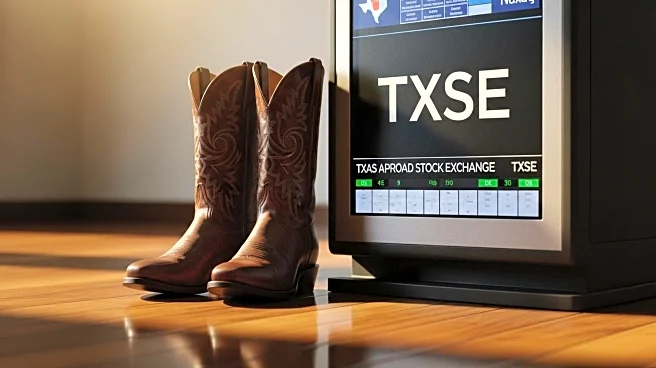What's Happening?
The Texas Stock Exchange (TXSE) has received formal approval from federal regulators to launch as a nationally traded stock exchange. This marks the first approval for a fully integrated American stock exchange in decades. The TXSE, based in Dallas, aims to challenge the dominance of the New York Stock Exchange (NYSE) and Nasdaq by offering an alternative platform for corporate listings. The exchange is backed by major investors such as BlackRock, Citadel Securities, and Charles Schwab. The approval has been supported by President Trump and other figures who criticize the existing exchanges for being overly regulated and politically influenced. The TXSE plans to operationalize its own system to match buyers and sellers of stocks, providing a new avenue for companies to raise capital.
Why It's Important?
The launch of the Texas Stock Exchange represents a significant shift in the U.S. financial landscape, potentially altering the balance of power in the stock exchange market. By providing an alternative to the NYSE and Nasdaq, the TXSE could attract companies seeking a less regulated environment. This development could lead to an exodus of corporations and investors from New York, especially if political and regulatory climates there become less favorable. The TXSE's establishment in Texas, a state known for its pro-business environment, could further enhance the state's economic growth and attract more companies to relocate there. This move also reflects broader political and economic tensions, as some stakeholders seek to distance themselves from what they perceive as 'woke' corporate governance practices.
What's Next?
The Texas Stock Exchange is set to launch in 2026, with preparations already underway to establish its operations. As the exchange becomes operational, it is expected to attract more companies and investors, potentially leading to increased economic activity in Texas. Political figures like Senator Ted Cruz have expressed support, predicting that the TXSE will drive significant business away from New York. The exchange's success could prompt other states to consider similar initiatives, further decentralizing the U.S. financial market. Additionally, the TXSE's apolitical stance may appeal to companies and investors looking to avoid political influences in their financial dealings.
Beyond the Headlines
The establishment of the Texas Stock Exchange could have long-term implications for the U.S. financial system. It challenges the traditional dominance of New York as the financial capital and may lead to a reevaluation of regulatory practices across the country. The TXSE's focus on reducing the burden of going public could encourage more companies to enter the public markets, reversing the trend of declining publicly traded companies. This development also highlights the ongoing cultural and political debates surrounding corporate governance and the role of political ideology in business practices.









